|
by Dawn
Brazell
Public Relations
An earthy, slightly sweet scent of
basil wafts through the air,
permeating the picnic spot of some
lucky dietitians who opted to have
a midday picnic in the MUSC's
Urban Farm.
The fresh basil
came straight from the garden,
sitting in a pile of green on the
table. Nina Crowley, a registered
dietitian, arranges it on her
fresh tomatoes. "It lets us
practice what we preach. We're
connecting with our food."
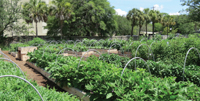 MUSC's half-acre
Urban Farm reaps a rich harvest
in its use as a living classroom
for MUSC employees, staff,
students, patients and the
community. MUSC's half-acre
Urban Farm reaps a rich harvest
in its use as a living classroom
for MUSC employees, staff,
students, patients and the
community.
She loves
having the garden, which is
located on the corner of Bee and
President streets, in her work's
backyard. She recently took a
group of bariatric patients to the
farm. One of the patient's sons
had never had a sweet pea before
and tried it. "He loved it."
The patients
enjoyed the visit, commenting that
they felt more comfortable and
confident about trying new foods
after visiting the garden, which
will have its open house, 8 a.m.
to 5 p.m. June 28.
Another
picnicker, registered dietitian
Debbie Petitpain, agrees that the
garden is the best nutritional
teacher there is. Most people's
barrier is that they just haven't
seen or tasted a food. She brought
patients out as well and didn't
have to do anything to get the
conversation going, she said.
"They had hands-on collaboration.
They can see it, taste it and feel
it. Even without tasting it, just
smelling it," she said, taking a
deep breath of the basil-scented
air, "you know what to expect."
All the
dietitians gathered said that the
farm, which can be booked for
picnics, is a great way to get
recharged from work in a healthy
environment. Betty Oswald, a
medical technologist and research
coordinator with MUSC, frequently
volunteers in the garden. She has
a small vegetable garden at home
as well, but she enjoys getting
out into the fresh air and
greenery.
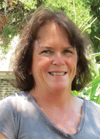 Betty Oswald Betty Oswald
"It gets you
out of that artificial light and
lets you learn about so many
things and about ways to prepare
food."
Take basil, for
instance. One of her favorite tips
is to chop it up fresh and place
in an ice cube tray with just a
little water. Then the cubes can
be popped out at any time for a
refreshing addition to spaghetti
or stews. Oswald said she loves
being able to eat fresh food.
A group of
MUSC dietitians enjoys an
outdoor picnic. From left is
Nina Crowley, Tonya Turner,
Ashleigh Ricevuto, Vanessa Clark
and Debbie Petitpain. Far right,
is Suzan Whelan, who is farm
coordinator. 
"I can't tell
you the last time I opened a can."
This is just
what Susan Johnson, Ph.D.,
director of the Office of Health
Promotion, wants to hear.
"The vision of
the farm is to be a living
classroom."
The half-acre
farm will be used for workshops,
seminars, volunteer workdays and
school tours. Participants will be
educated on the value of
incorporating vegetables into
their diets through cooking and
nutrition lessons and will
experience a unique opportunity to
engage in hands-on learning about
sustainable urban agriculture.
"Although it is
still in a pilot stage, I see the
farm becoming a great way to
increase awareness of local food,
about what crops look like and how
they grow. We aren't just
interested in planting vegetables
and flowers, we're interested in
using the farm as an educational
tool to help people learn about
sustainable food systems."
There is a
wide range of harvest in MUSC's
Urban Farm from eggplant to
watermelons. Flowers also have
been planted for pollination
purposes.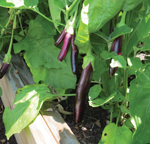
The farm
leadership also envisions the plot
as a gathering place on campus
that can be used for special
events from lectures and cooking
demonstrations to opportunities
for academic departments to
connect with the farm.
She said she's
amazed at the connections that
already are happening. Garden
harvest is being shared with
participants and volunteers who
attend work and learn sessions.
MUSC chefs are incorporating some
of the produce, particularly
herbs, into the wellness items
being served.
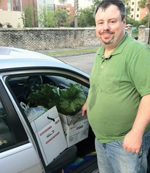 Morey J. Lent III,
an MUSC employee and member of
The Church of The Holy Communion
at 218 Ashley Ave., takes
produce from the farm to use in
the church's pantry program. The
church distributes food to needy
people in the Canonborough
neighborhood near the church. Morey J. Lent III,
an MUSC employee and member of
The Church of The Holy Communion
at 218 Ashley Ave., takes
produce from the farm to use in
the church's pantry program. The
church distributes food to needy
people in the Canonborough
neighborhood near the church.
"We also have
donated produce to Lowcountry Food
Bank, Charleston Area Children's
Garden Project, Ronald McDonald
House and Hope Lodge. We want to
be sure we get fresh produce into
the hands of people who need it
the most."
Educational
programs are being customized for
special MUSC groups such as Weight
Management, Bariatric Surgery
Program, Healthy Charleston
Challenge and STAR North IOP
Children's Day Treatment, which
serves low-income youth with
mental health diagnoses and
behavior problems.
"We plan to
expand our programming to
accommodate as many groups as
possible, both within our own
organization and reaching out to
the community."
Johnson is
pleased to see how well the garden
is flourishing. One reason is the
MUSC employees and students who
love it.
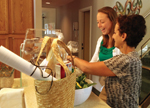 Rachel Hubbard,
left, house manager at Ronald
McDonald House, delights in
getting produce from MUSC's
Urban Farm and other donations
from Suzan Whelan that were
purchased by the MUSC Urban Farm
Leadership Team to provide a
meal. Rachel Hubbard,
left, house manager at Ronald
McDonald House, delights in
getting produce from MUSC's
Urban Farm and other donations
from Suzan Whelan that were
purchased by the MUSC Urban Farm
Leadership Team to provide a
meal.
Chris Clark, a
second-year student in the College
of Medicine, became interested in
the farm while seeing it being
constructed. He found out about
the work-and-learn sessions on
Wednesdays and Saturdays and has
attended as many as he can.
"I was raised
in rural Alabama and grew up
gardening. I currently live on the
peninsula and have a small
vegetable garden of my own, along
with four backyard chickens. At
the open house, I plan to share
the benefits of keeping chickens
and talk about their care, housing
and address other important
concerns that people new to
chickens may have."
Jake Schubert,
a second-semester accelerated BSN
student in the College of Nursing,
said he also grew up with a garden
in his backyard and has always had
an affinity for the outdoors. He
plans to share the important role
honeybees play in food production
systems. Schubert, who has kept
several hives in the past, is
fascinated with the complex
structure of bee colonies.
He plans to
host a honeybee session that
includes a hive full of bees
(enclosed in glass) at the open
house at 2:30 p.m. so visitors can
get up close and personal.
"I am excited
to be involved in the MUSC farm
because throughout history food
has always played a critical role
in keeping people healthy. With
the current obesity epidemic, this
fact is even more apparent."
MUSC Urban Farm Open House
When:
8 a.m. – 5 p.m., Thursday, June 28
Where: In the Farm on
the corner of Bee & President
streets
What: There will be
tours, volunteer orientation,
training and educational sessions.
Topics include: benefits of an
Urban Farm, organic pest control,
sensational salads, urban
chickens, beekeeping, composting
and more. At noon, a short program
will introduce the team and
MUSC/Sodexo chefs Brett Cunningham
and Ferando Middleton will present
a cooking demonstration using
fresh farm ingredients with free
tasting samples.
Who: Open to the
public. No reservations required.
For a detailed schedule, go to www.musc.edu/urbanfarm
or visit our facebook page at www.facebook.com/muscurbanfarm.
|



 MUSC's half-acre
Urban Farm reaps a rich harvest
in its use as a living classroom
for MUSC employees, staff,
students, patients and the
community.
MUSC's half-acre
Urban Farm reaps a rich harvest
in its use as a living classroom
for MUSC employees, staff,
students, patients and the
community.  Betty Oswald
Betty Oswald

 Morey J. Lent III,
an MUSC employee and member of
The Church of The Holy Communion
at 218 Ashley Ave., takes
produce from the farm to use in
the church's pantry program. The
church distributes food to needy
people in the Canonborough
neighborhood near the church.
Morey J. Lent III,
an MUSC employee and member of
The Church of The Holy Communion
at 218 Ashley Ave., takes
produce from the farm to use in
the church's pantry program. The
church distributes food to needy
people in the Canonborough
neighborhood near the church.  Rachel Hubbard,
left, house manager at Ronald
McDonald House, delights in
getting produce from MUSC's
Urban Farm and other donations
from Suzan Whelan that were
purchased by the MUSC Urban Farm
Leadership Team to provide a
meal.
Rachel Hubbard,
left, house manager at Ronald
McDonald House, delights in
getting produce from MUSC's
Urban Farm and other donations
from Suzan Whelan that were
purchased by the MUSC Urban Farm
Leadership Team to provide a
meal.